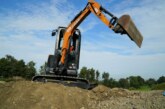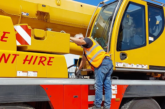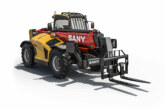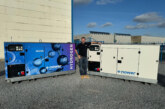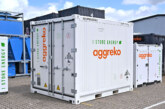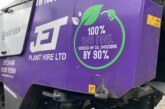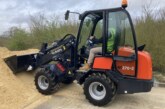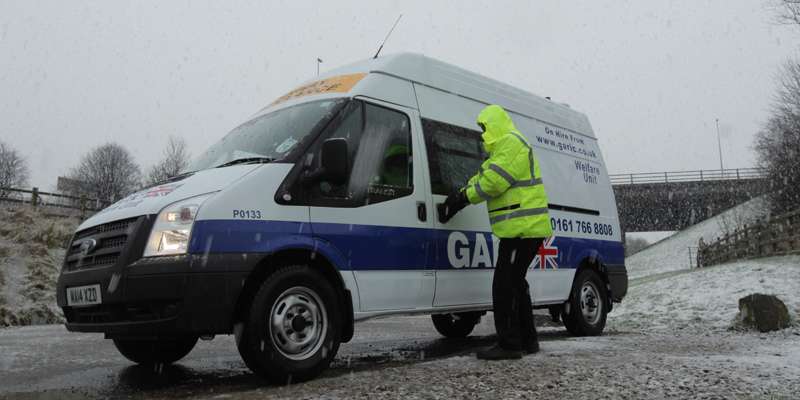
Construction Plant News assesses the changes to the European Community Whole Vehicle Type Approval (ECWVTA) regulations.
Growing awareness across the construction sector about the need to provide adequate welfare facilities on all sites, whatever the size or however remote, has led to increased demand for mobile welfare vehicles. Generally speaking the most popular solution is converted panel vans that have canteens complete with microwaves and hot water, flushing toilets with sinks, showers and seating for up to 7 workers.
Whether purchased or hired, these clever hybrid vehicles must adhere to very specific regulations and cannot be treated as just a simple addition to a construction company’s fleet.
“In the past couple of years we have seen a number of new far-reaching health and safety initiatives,” comments Neil Richardson, director of welfare equipment supplier Garic. “The construction sector invests millions of pounds in training and equipment to improve standards, but for us one of the biggest safety game-changers has been the extension to the scope of European Community Whole Vehicle Type Approval (ECWVTA) regulations. These have put even greater focus on the design and manufacturing standards for all types of vehicles, including mobile welfare units – of which it is estimated there are more than 2,500 on the road in the UK.”
Type Approval legislation aims to ensure all vehicles are ‘safe to use on the road and have a lower impact on the environment’. The scope of the regulations has broadened to include ‘Category NI – vehicles designed and constructed for the carriage of goods and having a mass not exceeding 3.5 tonnes’ – those most commonly used for welfare vehicle conversions.
“The construction sector invests millions of pounds in training and equipment to improve standards, but for us one of the biggest safety game-changers has been the extension to the scope of European Community Whole Vehicle Type Approval (ECWVTA) regulations.”
Lionel Curtis, Technical Director of commercial vehicle body and trailer manufacturer The Cartwright Group explains: “The designs for our welfare van conversions have to meet the new standards which dictate the weight, number of seats, positioning of seatbelts, lights – in fact, every aspect of the design. Stringent requirements significantly improve safety and reduce the risk of accidents, and these modern welfare vehicles, with their secure seating, properly incorporated kitchen areas and toilets are fit for their purpose, safely carrying personnel to and from site. Over the years I’ve seen some alarmingly botched panel van conversions, even vans where chaps had to sit on a plank suspended between boxes in the back. Poorly converted vehicles need to be a thing of the past and the crux of the problem lies with raising awareness amongst end-users.”
So what does all this mean for health & safety, plant and fleet managers? Crucially, it means that the onus is on them, the company they work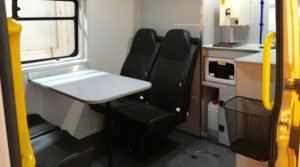 for and the driver of the vehicle to ensure that their mobile welfare unit has been registered and holds up to date Type Approved certification. With the average mobile welfare van carrying up to 7 personnel at any one time, it is imperative that those people are given the utmost protection should the vehicle be involved in a collision. If this happened, not only would insurance policies be null and void; the offence could land the person responsible with a hefty fine, penalty points and even a prison sentence. If the collision resulted in death, it’s not just the driver who could be held to blame, the employer is liable too.
for and the driver of the vehicle to ensure that their mobile welfare unit has been registered and holds up to date Type Approved certification. With the average mobile welfare van carrying up to 7 personnel at any one time, it is imperative that those people are given the utmost protection should the vehicle be involved in a collision. If this happened, not only would insurance policies be null and void; the offence could land the person responsible with a hefty fine, penalty points and even a prison sentence. If the collision resulted in death, it’s not just the driver who could be held to blame, the employer is liable too.
Neil Richardson concludes: “Companies hiring or buying a welfare van should always go to a reputable supplier and check to see that their vehicles have Type Approval. These vans transport thousands of workers everyday to sites all over the country, but often they are simply seen as an extension to the company’s fleet, and not afforded the questions which should be asked.”
TYPE APPROVAL IN SUMMARY:
• Legislation introduced in 2013 to ensure all van conversions meet high safety and environmental standards and conform to consistent production quality
• The Vehicle Certification Agency (VCA) is the Department of Transport’s national approval authority for new road vehicles
• Type approval is the testing and certification process to ensure that safety and environmental standards are met by vehicle and component manufacturers
• ‘Type’ refers to the specifics of the vehicle conversion. Each type is examined and only when the production processes meet the VCA standards can any more of that type be manufactured and sold
For further information on the range of welfare solutions available from Garic visit http://garic.co.uk/

